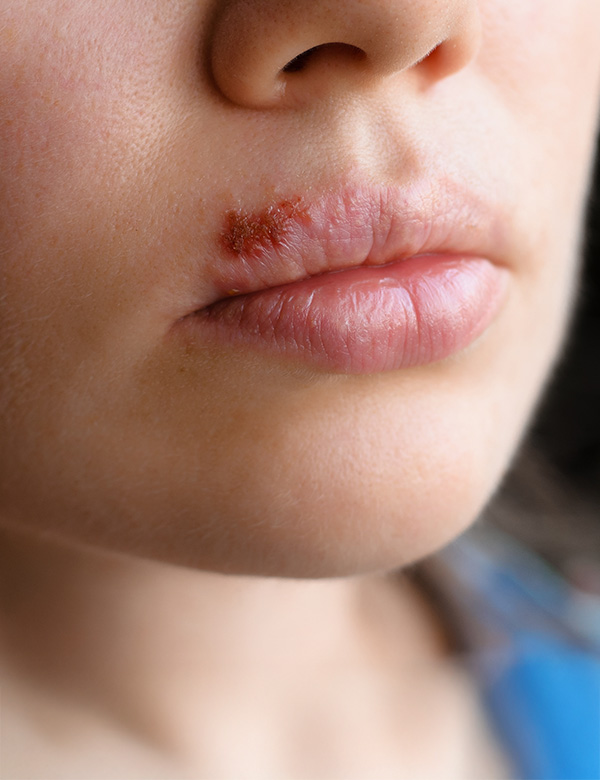Syphilis
Syphilis – also called Lues – detect and treat it early – discreet testing by experienced dermatologists at Derma Medical Clinic in Zurich – Sihlcity
Syphilis (Lues)
Chronische Abszesse und schmerzhafte Knoten durch erfahrenen Hautarzt abklären und behandeln in der Derma Medical Clinic in Zürich - Sihlcity
Syphilis – a chronic, bacterial sexually transmitted infection – can be detected and treated with a blood test
Tests
Blood test
Swab if needed
Procedure
Confidential consultation
Blood sample
Duration
a few minutes
What is syphilis?
Syphilis – also known medically as Lues – is a chronic bacterial sexually transmitted infection.
The infection goes through several stages and can cause various symptoms or go completely unnoticed.
Transmission usually happens through unprotected vaginal, anal, or oral sex. It can be passed on even without obvious symptoms.
If left untreated, syphilis can spread through the body and lead to serious complications over time – for example, inflammation of the nerves, blood vessels, brain, or heart.
That’s why early diagnosis is especially important.
Getting tested for syphilis is a good idea if you …
- notice a painless wound or hard sore in the intimate area that doesn’t heal after several days
- have skin rashes, fever, night sweats or swollen lymph nodes without a clear cause
- are sexually active, especially with changing partners or have unprotected sex
- have learned that a previous sexual partner was diagnosed with syphilis
- are pregnant or planning a pregnancy, as syphilis can be passed to the unborn child
- want to know if a previous infection has cleared up or still needs treatment
Typical symptoms in men:
- painless sores on the penis, anus, or in the mouth – often unnoticed
- a few weeks after infection: rash, swollen lymph nodes, or flu-like symptoms
Typical symptoms in women:
- painless sores on the vulva, cervix, or around the anus (often go unnoticed)
- rash, changes to the lining of the mouth or genitals, swollen lymph nodes, or flu-like symptoms
- In women, the infection often causes no symptoms – testing is still worthwhile

What is syphilis?
Syphilis – also known medically as Lues – is a chronic bacterial sexually transmitted infection.
The infection goes through several stages and can cause various symptoms or go completely unnoticed.
Transmission usually happens through unprotected vaginal, anal, or oral sex. It can be passed on even without obvious symptoms.
If left untreated, syphilis can spread through the body and lead to serious complications over time – for example, inflammation of the nerves, blood vessels, brain, or heart.
That’s why early diagnosis is especially important.
Who should get tested and treated for syphilis?
Getting tested for syphilis is a good idea if you …
- notice a painless wound or hard sore in the intimate area that doesn’t heal after several days
- have skin rashes, fever, night sweats or swollen lymph nodes without a clear cause
- are sexually active, especially with changing partners or have unprotected sex
- have learned that a previous sexual partner was diagnosed with syphilis
- are pregnant or planning a pregnancy, as syphilis can be passed to the unborn child
- want to know if a previous infection has cleared up or still needs treatment
Typical symptoms in men:
- painless sores on the penis, anus, or in the mouth – often unnoticed
- a few weeks after infection: rash, swollen lymph nodes, or flu-like symptoms
Typical symptoms in women:
- painless sores on the vulva, cervix, or around the anus (often go unnoticed)
- rash, changes to the lining of the mouth or genitals, swollen lymph nodes, or flu-like symptoms
- In women, the infection often causes no symptoms – testing is still worthwhile
Treatment
Testing is done with a blood sample. The test shows whether there is a current or past infection.
If there are visible skin changes or changes in the lining – for example in the genital, mouth or anal area – a swab may be taken.
The blood test result is usually available within a few days.
What happens if the test is positive?
Treatment is done with an antibiotic, usually by injection.
Depending on the infection stage, one dose or several weeks of treatment may be needed.
Even without symptoms, treatment is important to prevent spread in the body or passing it to others.
Your partner should also be tested and treated if necessary.
Initial consultation
We first talk with you confidentially about symptoms, possible risk contacts, or the reason for the test.
Blood sample
A simple blood test is enough. If there are visible skin changes, we may also take a swab.
Lab analysis
We’ll send the sample to a lab for analysis. Results are usually available within a few days.
Treatment
If the result is positive, treatment is done with an appropriate antibiotic – usually by injection, sometimes more than once at set intervals.
Treating partner
To avoid passing the infection back and forth, it’s important to test and, if needed, treat your sexual partner too.
Follow-up
After treatment, we check your blood values regularly to make sure the infection has completely cleared.

At Derma Medical Clinic, syphilis is treated only by experienced dermatology specialists:
- Dr. Benjamin Miller, board-certified dermatologist and phlebologist
- Dr. Markus Dendorfer, board-certified dermatologist and pediatric dermatology specialist
Both have many years of experience diagnosing and treating sexually transmitted infections.

Dr. med. Benjamin Miller
Board-certified Specialist in Dermatology & Venereology FMH

Dr. med. Markus Dendorfer
Board-certified Specialist in Dermatology & Venereology FMH
What to expect from us
Discreet and easy testing
Testing is done in a calm and respectful environment – no uncomfortable questions. Taking the sample only takes a few minutes.
Treatment with close follow-up
Treatment follows the latest medical standards, tailored to the stage of the infection, with follow-up care included.
Partners can be treated too
Since syphilis is contagious, it’s medically recommended to include your partner in the treatment – we make this easy for you.
Everything in one place
You get diagnosis, treatment, and cosmetic care in one place. That means consistent care, short paths, and trusted specialists – from the first visit to your follow-up.
Have you noticed unusual changes in the skin in your intimate area or unclear symptoms like rash, fever, or swollen lymph nodes?
Book your appointment now to get tested for syphilis at Derma Medical Clinic in Zurich – Sihlcity.
FAQ – Frequently asked questions about syphilis
What is syphilis (Lues)?
Syphilis – also called Lues – is a bacterial sexually transmitted infection. It progresses in stages and can have serious health effects if left untreated.
How can you recognize syphilis?
In the first stage, a painless sore usually appears in the intimate area, on the anus, or in the mouth – this is known as a “hard chancre.” Later stages can cause rashes, flu-like symptoms, swollen lymph nodes, or changes in the lining of the mouth or genitals. Many signs are nonspecific – a test gives clarity.
What symptoms does syphilis cause in men and women?
Typical signs include:
- painless sore in the genital or anal area
- rash on hands, feet, or over the entire body
- swollen lymph nodes
- fever, tiredness, hair loss
Without treatment, syphilis can affect the nervous system, heart, eyes, or other organs.
How is syphilis transmitted?
Infection mainly happens through unprotected vaginal, anal, or oral sex. It can be passed on even without any visible symptoms.
How is syphilis diagnosed?
Syphilis is usually diagnosed with a blood test that checks for antibodies against the bacteria. In early stages, a swab from a sore can also be tested.
Is syphilis curable?
Yes – syphilis can be effectively treated with antibiotics (usually penicillin). Early diagnosis is key. Your sexual partner(s) should also be tested and treated.
How long is syphilis contagious?
Syphilis is highly contagious in the early and secondary stages. After starting antibiotic treatment, the risk drops quickly. It is still best to avoid sex for a while – we’ll advise you individually.
What happens if syphilis is not treated?
If left untreated, syphilis can cause long-term damage years later – such as to the brain, nerves, blood vessels, or inner organs. But if detected and treated early, syphilis can be fully cured.
How can you protect yourself from syphilis?
Syphilis can spread not only through sex. Oral sex, intimate touching, or close skin contact in the genital or anal area can also lead to infection – especially if infected skin or mucous areas are involved.
Condoms reduce the risk but don’t provide full protection. Regular STI tests, vaccine counseling (for other STIs), and open communication with partners help you and others stay safe.




